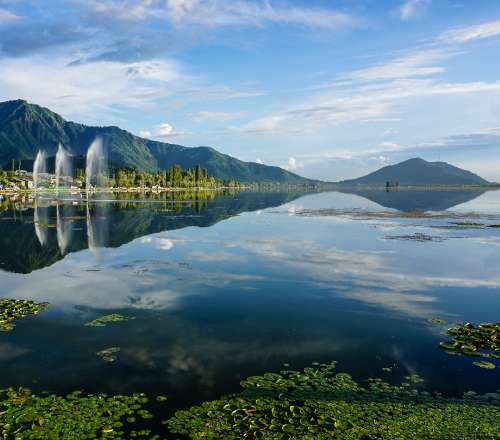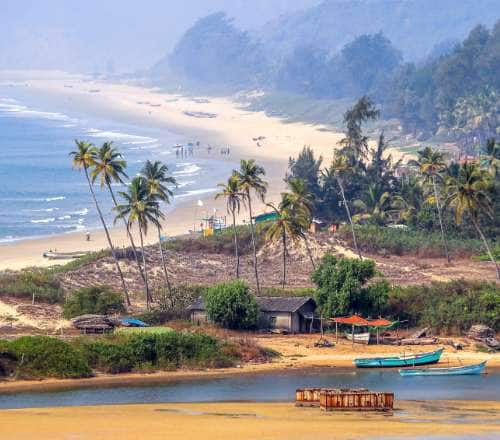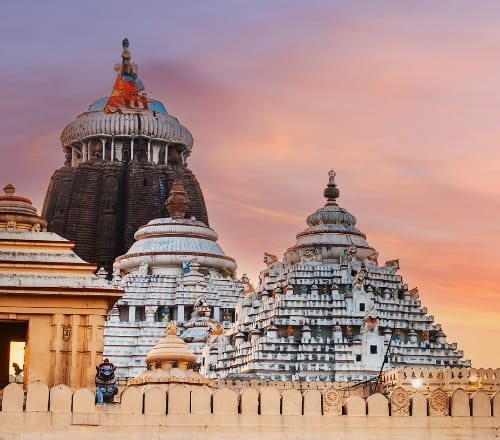Stay logged in to proceed with bookings, orders and offers.
On changing the terminal, you will loose items in your cart. Are you sure you want to change your terminal?
An Adventurous Journey into the Best Wildlife Sanctuaries and National Parks in Kerala.
Kerala, often called "God's Own Country," is a paradise for nature enthusiasts and wildlife lovers alike. Nestled in the lush Western Ghats and adorned with stunning landscapes, Kerala boasts some of India's most captivating wildlife sanctuaries and national parks. From the mist-covered peaks of Eravikulam National Park to the pristine waters of Periyar Wildlife Sanctuary, each sanctuary offers a unique experience. Discover their incredible diversity of flora and fauna, spot rare and endangered species, and understand the conservation efforts that make these places truly special. So, let the wild wanderlust take over, as we venture into Kerala's wild heartlands!
Read More
Read Less
Eravikulam National Park, in the Idukki district of Kerala, nestled in the Western Ghats, is renowned for its rich biodiversity. The park is particularly famous for being the natural habitat of the endangered Nilgiri Tahr, a rare mountain goat species. Trekkers can explore the park's various trails with breathtaking views of the valleys and mountains. Apart from the Nilgiri Tahr, the park is also home to diverse wildlife, including elephants, leopards, and various bird species. To make the most of your visit, plan your trip during the park's peak season, which is usually from September to November. Opt for the early morning guided tours to increase your chances of spotting wildlife and enjoying the picturesque sunrise.
Perched in the heart of Thekkady, Periyar Wildlife Sanctuary is a jewel in Kerala's wildlife crown. This sprawling sanctuary is centred on the picturesque Periyar Lake, where visitors can enjoy boat safaris to spot a myriad of wildlife. The sanctuary is best known for its population of Asian elephants that frequent the lake's banks for water. Apart from elephants, Periyar is home to tigers, gaurs (Indian bison), sambar deer, and a variety of bird species. Nature enthusiasts can explore the numerous trekking trails and take in the lush greenery and diverse flora. The sanctuary's serene ambience and incredible wildlife encounters make it an ideal destination for eco-tourists and wildlife lovers. The best time to visit is during the cooler months of October to February. Booking the boat safari in advance is recommended, especially during peak tourist seasons.
Amidst the pristine Western Ghats, Idukki Wildlife Sanctuary is a lesser-known gem that offers a tranquil escape into nature's embrace. Spread across the Thodupuzha and Udumpanchola taluks, the sanctuary has evergreen forests, grasslands, and hills. Idukki is home to a variety of wildlife, including elephants, sambar deer, and wild boars. The diverse birdlife makes it an excellent destination for birdwatching enthusiasts. Trekking and camping activities offer an opportunity to soak in the beauty of the sanctuary. Idukki Wildlife Sanctuary presents an opportunity to connect with nature in all its unspoilt glory. Opt for a guided trek with experienced naturalists to explore the sanctuary and expand your knowledge. Carry essential supplies, water, and insect repellent for a comfortable trek. It is advisable to visit during the winter months (November to February) to avoid the monsoon season and enjoy pleasant weather.
Parambikulam Wildlife Sanctuary in the Palakkad district of Kerala is a treasure trove of biodiversity. The sprawling reservoir formed by the Parambikulam Dam is surrounded by lush forests and picturesque hills. The sanctuary has a variety of flora and fauna, including the Malabar giant squirrel, lion-tailed macaque, and elephants. Trekking trails lead visitors through dense forests, grasslands, and scenic valleys, with opportunities for wildlife sightings and birdwatching. The eco-tourism initiatives in the sanctuary allow visitors to experience the wilderness responsibly. A visit to Parambikulam Wildlife Sanctuary helps develop an appreciation for its conservation efforts. Choose one of the eco-tourism packages offered by the forest department. These packages include guided treks, wildlife sightings, and visits to the Parambikulam Dam. Book your stay at the sanctuary's forest guesthouses well in advance, especially during peak tourist seasons.
As the name suggests, Silent Valley National Park is a serene haven of tropical evergreen forests, untouched by human intervention. Located in the Palakkad district, this park is celebrated for its untouched biodiversity and rich ecological significance. The dense forests house a wide range of flora and fauna, including endangered species like the Lion-tailed Macaque. Exploring the park's trails offers opportunities to witness various bird species and butterflies. Silent Valley's unique ecosystem attracts researchers, nature enthusiasts, and conservationists alike. The absence of human settlements within the core area has allowed this pristine wilderness to thrive, making it a sanctuary for those seeking an immersive and undisturbed natural experience. Explore the beauty of Silent Valley National Park by availing of the guided trekking options offered by the Kerala Forest Department. Consider visiting during the drier months (December to April) to avoid heavy rainfall and enjoy clear views of the landscape.
Nestled in the picturesque Wayanad district, the Wayanad Wildlife Sanctuary is a stunning landscape characterized by dense forests, hills, and fertile valleys. The sanctuary's diverse terrain provides a suitable habitat for elephants, tigers, leopards, and numerous other animal species. Trekking through the sanctuary's trails offers a chance to witness herds of elephants and catch glimpses of elusive predators. The region is also known for its significant population of bird species, making it a haven for birdwatching enthusiasts. The tribal communities residing in the sanctuary's vicinity add a cultural dimension to visitors' experiences. Wayanad Wildlife Sanctuary's captivating beauty and thriving wildlife make it a must-visit destination for nature lovers and wildlife enthusiasts. To fully appreciate the wildlife at Wayanad Sanctuary, engage local guides who possess in-depth knowledge about the animals and their habitats. Opt for the early morning or late afternoon jeep safaris for better chances of spotting wildlife.
Also known as the Salim Ali Bird Sanctuary, Thattekad is a birder's paradise situated near Kochi. The sanctuary is named after the renowned ornithologist Dr Salim Ali and is one of the richest bird habitats in peninsular India. The lush greenery, tropical evergreen forests, and the Periyar River that flows through the sanctuary create a perfect setting for avian diversity. Thattekad is home to a vast array of resident and migratory birds, including Malabar grey hornbills, white-bellied blue flycatchers, and crimson-backed sunbirds. Birdwatchers can spot these feathered wonders along the well-marked trails and from watchtowers within the sanctuary. For an immersive birdwatching experience, hire experienced local bird guides to identify and spot various bird species. The best time to visit is during the migratory season (November to February), when you can witness an array of migratory birds in addition to the resident species.
Mangalavanam Bird Sanctuary, located in the heart of Kochi, is a small but ecologically significant patch of mangrove forest. Despite its urban surroundings, the sanctuary serves as a vital refuge for migratory and resident birds. A walk along the narrow trails amidst the mangroves offers opportunities to spot various bird species, including kingfishers, egrets, and herons. The sanctuary's strategic location near the backwaters makes it an essential habitat for birds, attracting nature lovers and birdwatchers from across the region. Mangalavanam Bird Sanctuary provides a unique opportunity to witness the coexistence of nature and urbanization and emphasizes the importance of conserving these green pockets within cities. For optimal birdwatching opportunities, visit early in the morning or in the late afternoon.
Nestled on the banks of Vembanad Lake in the Kottayam district, Kumarakom Bird Sanctuary is a haven for avian enthusiasts. This wetland ecosystem, comprising mangroves, swamps, and waterways, attracts numerous migratory and resident bird species. Visitors can explore the sanctuary on traditional boats and witness the enchanting sight of birds in their natural habitat. The sanctuary is home to various species, including herons, egrets, kingfishers, and migratory birds like Siberian cranes and teals. The serene ambience and the harmonious coexistence of birds and the picturesque landscape make Kumarakom Bird Sanctuary a delightful destination for nature lovers and birdwatchers alike. To fully enjoy Kumarakom Bird Sanctuary, take a boat tour around Vembanad Lake and its bird-rich environs. The best time to visit is from November to February, when migratory birds flock to the area. Opt for a knowledgeable local guide to enhance your birdwatching experience and learn about the region's rich avian life.
A journey through Kerala’s wildlife sanctuaries can truly inspire you to form a deeper connection with nature and raise awareness about wildlife conservation. Let's cherish these wild havens and contribute to preserving their beauty for the wildlife, the people, and the future.





The Adani One expressly disclaims all liability, direct and indirect, in respect to actions taken or not taken based on any or all the contents of this Blog. The Blog is an opinion of the contributor based on the collation of data from various sources and is provided only for information purpose. Adani One does not canvass, advertise, solicit, invite or induct for any product, merchandise, information, brand or any other materials mentioned in the Blog, nor does it obtain any monetary benefit from the same. Reader is advised to read and apply his/her intellect and discretion in this regard. Any Intellectual Property mentioned in this blog belongs to the rightful owner. We do not intent to claim any interest over the same.